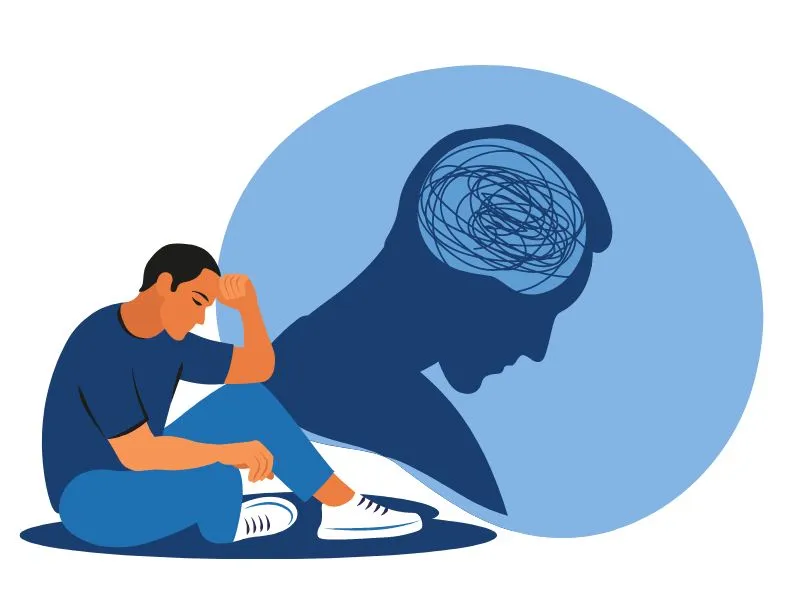People are being encouraged to seek support and be honest about their issues due to the increased knowledge and conversation about mental health in recent years. Although there has been some progress in lowering the stigma associated with mental health, men continue to face particular difficulties. There is still a clear divide between men and mental health, despite the fact that the public conversation on mental health taboos has transformed significantly over the past ten years. The issue extends far beyond the myth that men don't want to communicate their emotions; barriers, including stigma, male stereotypes, and societal problems, directly impact how men view, handle, and treat their mental health.
Why is men's mental health overlooked?
In our society, many men hide their emotions to appear strong, and because of this, mens mental health is often ignored. Many men refused to accept help from anyone because they thought society would judge them or consider them weak. Apart from that, work stress, money worries, and lack of support also contribute to their mental health. Without help, some turn to unhealthy coping methods, leading to serious mental health issues. To change this stereotypical society, we should talk openly, support those who seek help, and provide men with better resources. Mental health is important for everyone, and no one should struggle alone.
These taboos frequently have their origins in the expectations and assumptions that society has about men. Increasing awareness, confronting these taboos, and advancing a more sympathetic and perceptive perspective on men's mental health are critical.
We'll look at a few of these taboos in this blog and discuss how crucial it is to eliminate them to foster a healthier and more inclusive society.
1. "Real men don't cry": One of the most common men's mental health taboos is the stigma that expressing emotions, particularly vulnerability or sadness, is a sign of weakness. Boys are taught early on to be tough, stoic, and self-reliant. This societal expectation may challenge men who need assistance or want to share their emotional issues. A more sympathetic view of masculinity must be promoted to challenge the stigma that expressing emotions is a sign of weakness.
2. Societal Expectations for Men: Society frequently places unrealistic demands on men, such as being the main breadwinners, problem solvers, and sources of support. These expectations can be overwhelming and contribute to the development of mental health taboos. One way to challenge these expectations is to promote a more balanced and inclusive picture of masculinity where men feel empowered to give self-care, emotional health, and seeking help when necessary a higher priority.
3. "Seeking help is a sign of failure": The idea that seeking professional assistance or therapy refers to the inability of an individual to find solutions on one's own is another taboo that harms men's mental health. Men may feel pressure to handle their issues alone, fearing judgment or questioning their capabilities if they seek support. It is important to remove this myth and emphasize that asking for assistance is a brave act of self-care that gives people the tools and resources they need to deal with their problems more skillfully.
4. "Mental health is a women's issue." Men's experiences have been marginalized because mental health is frequently connected with women. Finding places where men can freely express their emotions and share their struggles without feeling judged or excluded may be challenging. By fostering understanding and empathy for mens mental health issues, it is critical to break this taboo. We can establish a supportive workplace for everyone, regardless of gender, by realizing that mental health is a universal human issue.
5. "The pressure to conform to masculine norms": Society frequently imposes severe standards of masculinity, such as always being powerful, dominating, and in charge. These expectations may pressure men to hide their feelings and continue as if everything is alright, even while they struggle inside. To break this taboo, we must work to create a society where men can show their masculinity in a variety of ways without fear of criticism or contempt.
Conclusion
It's time to break down the stigmas around men's mental health. By acknowledging and removing these societal barriers, we can build a more compassionate and welcoming environment that supports men's emotional health. Breaking the silence surrounding mens mental health requires a collective effort, including reshaping societal expectations, promoting open conversations, and ensuring accessible mental health resources. Doing so can empower men to prioritize their mental well-being and ultimately contribute to a healthier and more equitable society for all.
At Solh Wellness, we offer a dedicated support group to address the needs of men, providing them with a space to share their views and find support. We believe in the importance of prioritizing the mental health and well-being of all men. Join us to gain insights, connect with others, and receive the support you deserve on your mental health journey. You can also take sessions with our experts to understand your needs and enhance your well-being.



